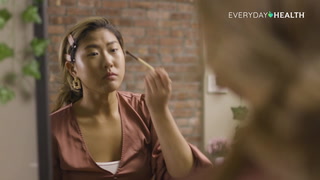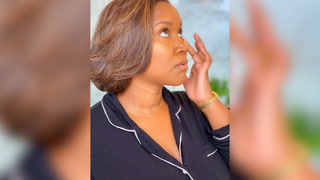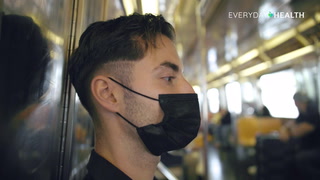An Influencer’s Insecurities About Eczema Become Her Strength
An Influencer’s Insecurities About Eczema Become Her Strength

Next up video playing in 10 seconds
As a full-time actor, model, and social media influencer, Esther Hong loves expressing her personality on camera. And as a Gemini, she has many personalities.
“I’m known as the wild card of my group,” says Hong, of Brooklyn, New York. “You never know which Esther you’re going to get for the day, but whichever Esther you do get, she’s always a vibe.”
Hong was first diagnosed with eczema when she was just 5 years old, after her parents noticed rashes on her arms, hands, and feet that weren’t going away. Even today, the first place eczema appears is on her arms. Patches also appear on her eyes, Cupid’s bow, and neck.
“It’s an itch that you can’t get rid of,” she says. “No matter how hard you scratch or what you put on, it just feels like a fiery spot on your body.”
At times, these symptoms took a toll on Hong. There were days when she didn’t want to leave her house. She’d even canceled gigs because a breakout appeared on her face.
“A lot of people talk about acne and how it affects them,” says Hong, “but no one ever talks about eczema.”
#NoFilter: Becoming an Influencer on Social Media — Despite Eczema Outbreaks
In March 2020, Hong left her full-time job in marketing to pursue a more creatively fulfilling career. The first step? Building her brand on social media through Instagram, TikTok, and YouTube.
She started out by testing and reviewing skin products but quickly realized they were triggering eczema flare-ups. And posting videos without filters left Hong feeling vulnerable. “All I could see is the eczema,” she says.
Because of that, eczema limited Hong’s ability to experiment with certain looks and express herself creatively on these platforms. That realization, she says, “definitely took a toll.”
One day, she flipped the script. She ditched the filters and started posting videos of what eczema looks like for her and how she manages it. “Instead of hiding that side of me, I decided to bring it to light,” she says.

For example, after a bad reaction to makeup triggered a huge flare-up, Hong took to TikTok to share her experience. She was initially nervous to share the video — “It was going to thousands of people,” she says — but Hong felt strongly about being open about eczema with others.
The response was overwhelming. “The beauty community, as well as the TikTok community, just came together and was able to support one another and share their stories,” she says.
“I think social media today has really glamorized this perfect image of what it means to be beautiful,” Hong says. “And I just always wanted to be an advocate for beauty beyond the perfect look. … I don’t want to be portrayed in a perfect image but to be seen as someone who was able to overcome those insecurities and be proud of the self that I am today.”
On Set With Eczema: Getting Camera Ready Without Triggering a Flare-Up
Hong also loves acting, but it requires makeup almost all of the time. Wearing a full face of makeup for the camera, especially for long stretches of time, can exacerbate eczema.
Through a bit of trial and error, Hong has learned how to prevent a flare-up while doing what she loves most. When she’s on set, she brings her own makeup, which is easier on her skin. Taking steps such as washing her face before camera makeup is applied and removing that makeup as soon as each gig is over has really helped her manage. On days when Hong can’t remove the makeup right away or stick to her skin-care routine, she does experience some swelling around her eyes and cracking on the skin of her lips.
“My body starts to feel the effects of the makeup on my face,” she says. “My skin starts to basically crack. I can feel the moisture slowly dripping from my skin.”
Regardless, Hong has no regrets about quitting her 9-to-5 job to pursue her dream of working in entertainment.
“Eczema has definitely made me question whether or not this industry is for me, simply because I have to be in front of a camera all the time,” she says. “But I have found that my personality always pulls through and allows me to break through those times where I feel like this may not be for me.”
It also helps that conventional beauty standards are changing, she says. “Media today is doing a way better job at targeting those with diverse backgrounds,” she says. “I feel like today more than ever, I’m able to show exactly that to people. … I’m still considered an actress in today’s world being just me.”
Images provided by Esther Hong.
This video interview took place in September 2021.
- Eczema Stats. National Eczema Association.

Susan Bard, MD
Medical Reviewer
Susan Bard, MD, is a clinical instructor in the department of dermatology at Weill Cornell Medicine and an adjunct clinical instructor in the department of dermatology at Mount Sinai in New York City. Her professional interests include Mohs micrographic surgery, cosmetic and laser procedures, and immunodermatology.
She is a procedural dermatologist with the American Board of Dermatology and a fellow of the American College of Mohs Surgery.
Dr. Bard has written numerous book chapters and articles for many prominent peer-reviewed journals, and authored the textbook The Laser Treatment of Vascular Lesions.

Maria Masters
Author
Maria Masters is a contributing editor and writer for Everyday Health and What to Expect, and she has held positions at Men's Health and Family Circle. Her work has appeared in Health, on Prevention.com, on MensJournal.com, and in HGTV Magazine, among numerous other print and digital publications.

